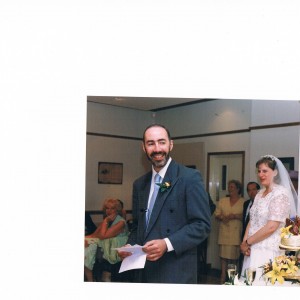Wedding speeches form an integral part of most receptions. Traditionally, one is delivered by the bride’s father, one by the best man and one by the groom. For now, let’s concentrate on the latter.
The groom’s speech is an opportunity to help the guests know a little more about either or both of you – preferably, in a witty and enjoyable manner. It may well offer a public demonstration of your affection and excitement. So there is a lot to get right (or wrong).
Elements
It is vital that the speech is not too long. Ten minutes will be quite long enough. It should focus on the bride – what she means to you, possibly how you met and maybe an anecdote that shows why you chose her. Crucially, it should be sincere.
Incidentally, don’t hold back from saying “my wife and I”, if you wish.
Of course, you need to thank everyone who contributed to the wedding (not just financially!). So it should be the parents of the bride, the participants (bridesmaids, ushers, etc.) and the guests. Absent friends may be mentioned here. Without overdoing it, a bit about the best man could go in (preferably, including a story about something you both got up to in the murky past!). (Liaise with your best man beforehand so you don’t double up on the same story.)
Delivery
Don’t rely on memory (especially on such a day), nor should you read out from a long script. Use notes, so you can make eye contact with your audience as much as possible.
However, when you talk about your new wife, say what attracted you, why you love her, relate an interesting/humorous episode. For this, you can address your remarks directly to her. And a compliment is unlikely to be taken amiss (your guests will love it too!).
Try and vary your delivery, so it is not monotonous.
Speed
However nervous you may be, take your time! Don’t mumble or gabble. Speak loudly and clearly. People will really want to hear what you have to say, so don’t frustrate or deprive them!
Humour
If you can start with a joke, then that is fine. However, ensure any joke you tell is funny – and that it is not crude or offensive. If you are hopeless at telling jokes, then it may be better to leave them out altogether.
If you are going to include one, then, direct a gentle jest at your best man (NOT at your new in-laws, unless you are VERY sure that it is appropriate and that they will be OK with it! Definitely don’t get off on the wrong foot …).
I took a great risk at my wedding, because I chose to be quite rude about my new wife (but I did say some nice things too!). I got away with it (although, of course, I am still suffering the fall-out to this day!) because my comments were funny (no, really!), but it’s a dangerous game to play.
Finish
Once you’ve thanked everybody, told a story or two and possibly talked about your excitement at the prospect of your new life, stop while you’re ahead. Propose a toast to the bridesmaids and/or your wife and then pass the microphone to your best man.
Notes
- Don’t forget to thank your in-laws or whoever financed the affair. Thank your father-in-law for his speech (and for producing such a wonderful daughter). Thank everybody on behalf of your wife too. Make mention of guests from afar, or special guests, your in-laws and your own parents. Don’t thank caterers, florists etc. who will have been paid for their services. Try not to spend too long thanking people.
- Don’t read out long lists.
- Resist the temptation to get blind drunk before your speech!
- Check beforehand with your best man that there’s no clash or excessive overlap/repetition in what you are both going to say in your speeches.
Prepare thoroughly beforehand, remember the tips about delivery, and you will manage a wonderful speech that you will enjoy making and that your guests will love hearing.

